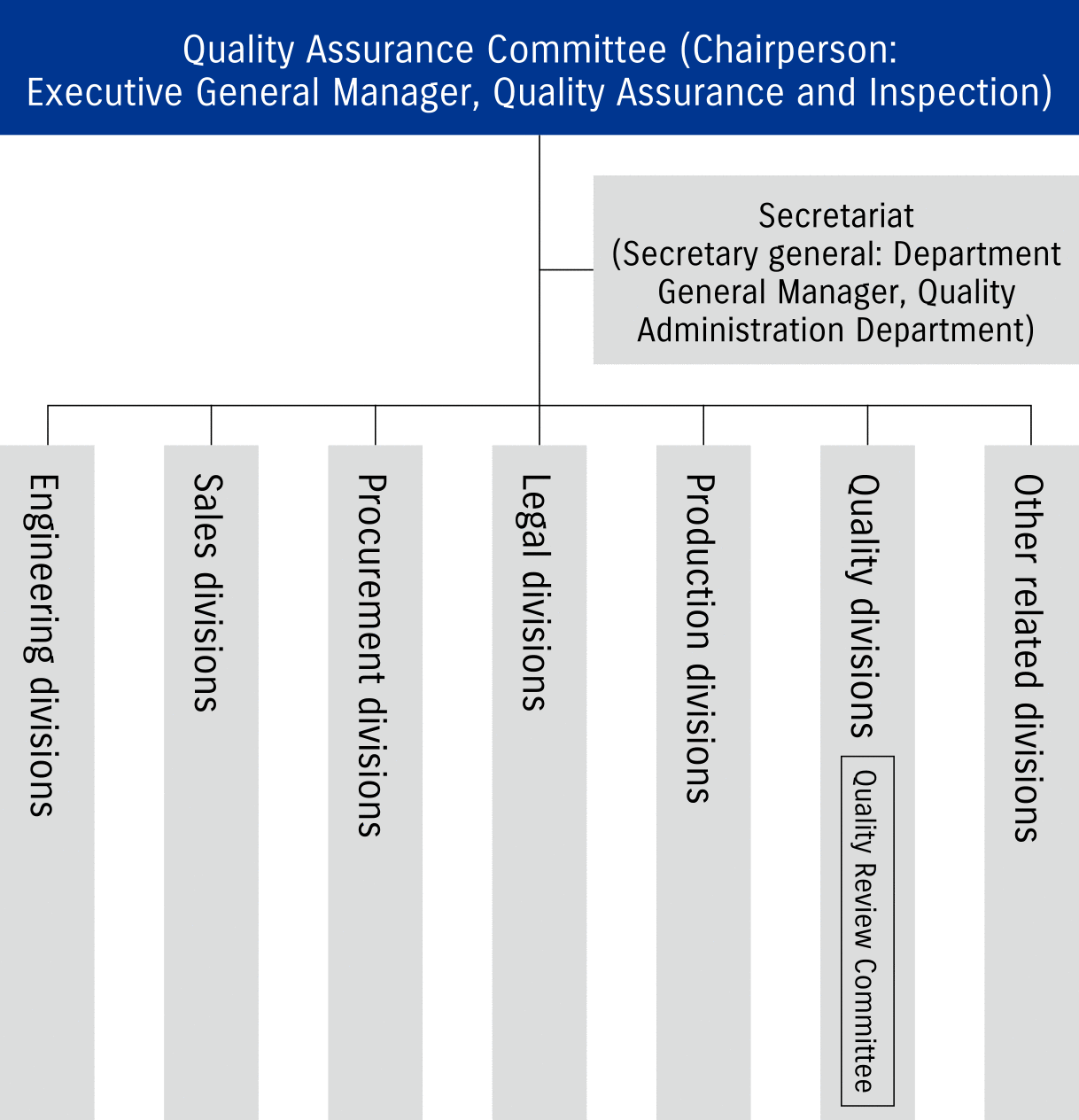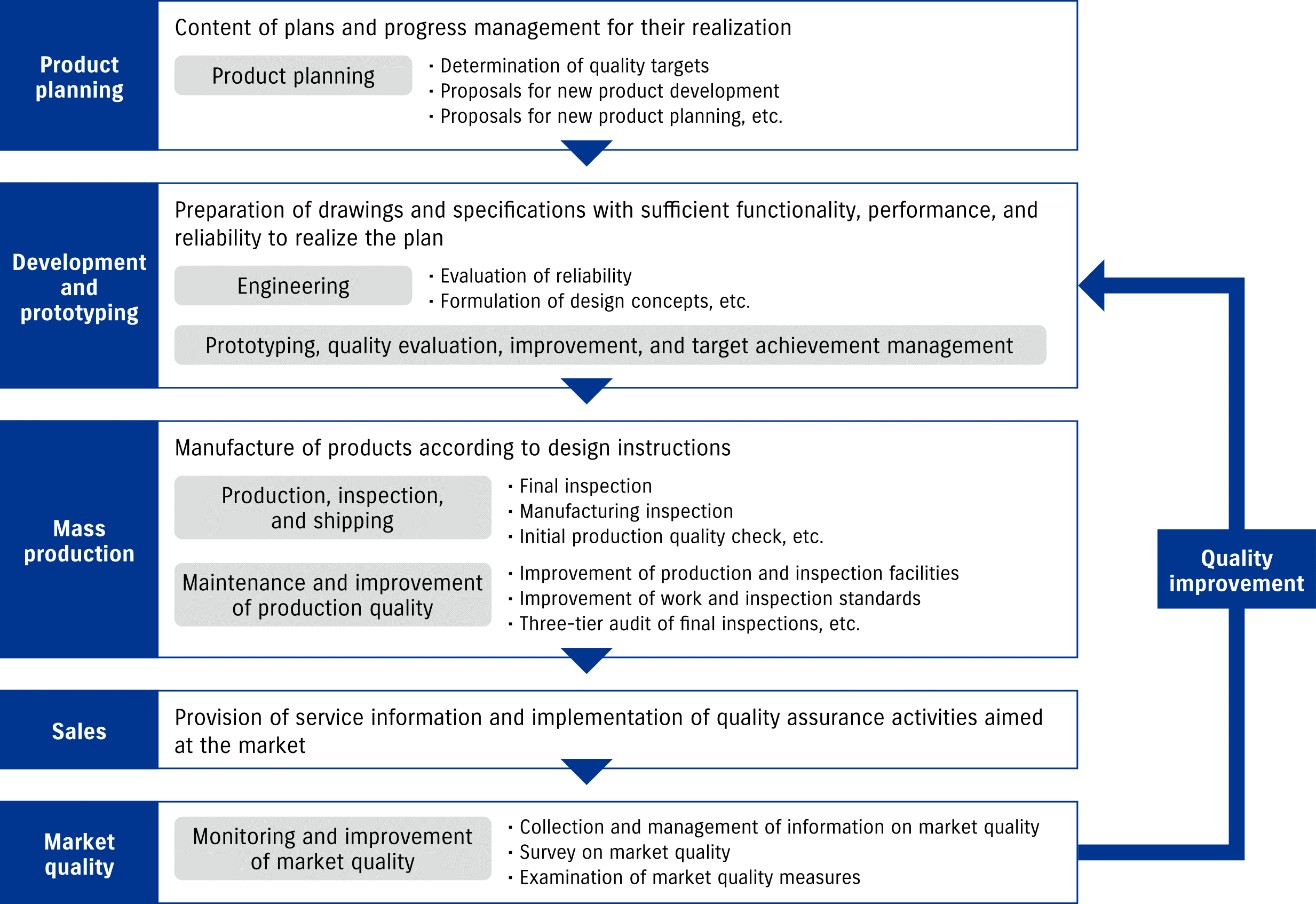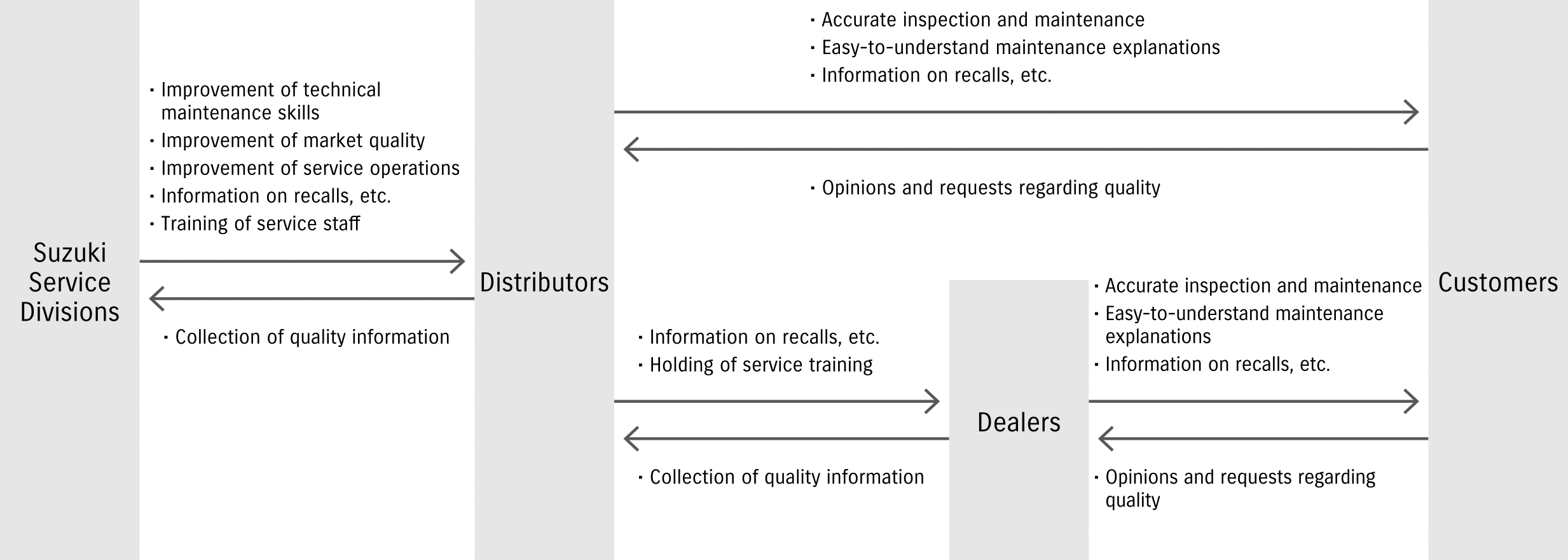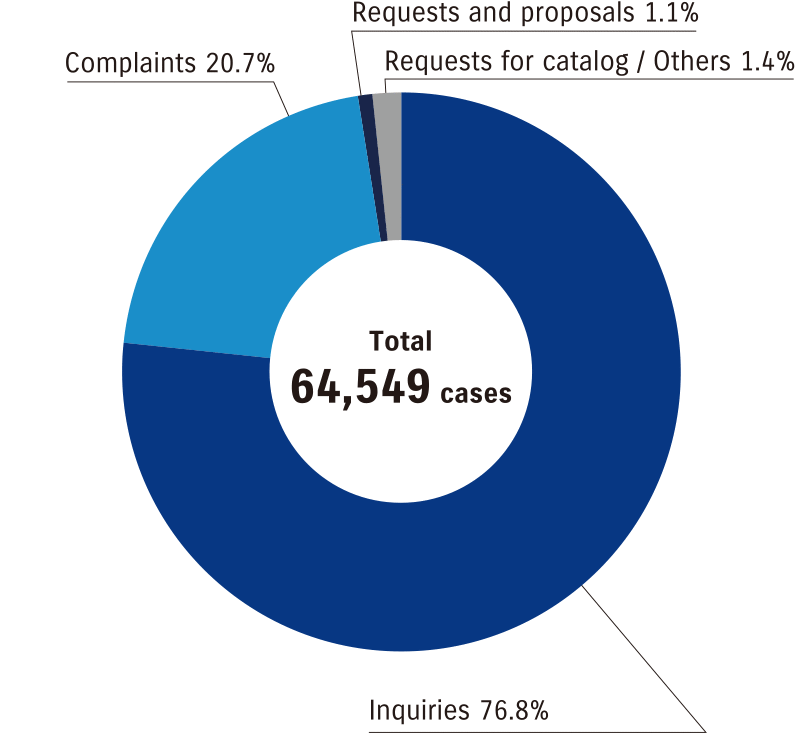As a manufacturer, Suzuki has been taking on the challenge of developing new technologies. No matter how good a technology is, it will not be recognized by customers as a product unless it is of good quality and an affordable price. Suzuki’s business is viable only when customers buy and use its products to their satisfaction. We therefore work to create high-quality, valuable products at an affordable price from the customer’s point of view.
Quality policy
Develop products of superior value by focusing on the customer
We are committed to providing quality products and services in accordance with our Mission Statement, Philosophy of Conduct, and the Suzuki Group Code of Conduct.
The first item of the Mission Statement, established in March 1962, has been Suzuki’s quality policy since 2003. It states our goal toward carrying out our social mission as a company. The highest goals of Suzuki and its reason for existence are the continuous production of even better products and the development of products of superior value. To achieve this goal, we are committed to manufacturing products that are focused on the customer and rooted in awareness of quality and improvement.
The meaning behind “Beauty” in “Sho-Sho-Kei-Tan-Bi (Smaller, Fewer, Lighter, Shorter, Beauty)” of our Philosophy of Conduct is that all activities are for the best interest of our customers, and that our customers can only be satisfied for the first time once we meet all criteria of performance, quality, cost, reliability, safety and security, and compliance.
Furthermore, we have established the Suzuki Group Code of Conduct as guidelines for officers and employees of the Suzuki Group to carry out their duties. Of these guidelines, the first item is “Realization of products and services of superior value,” and the second is “Activities on quality.” The entire Group unites to “develop and produce high-quality products that customers can use with peace of mind and will provide after-sales services, while giving first priority to customers’ safety and security,” which also leads to the idea of “providing customers with products and services exceeding their expectation.”
Structure for promoting quality and safety
The Company is working to strengthen its system for prompt investigation of causes and swift implementation of countermeasures to avoid situations where the prolonged response to quality issues causes major inconvenience to customers and an increase in the cost of countermeasures. The Company constantly keeps track of the latest status of quality issues at weekly and monthly meetings such as the Executive Committee. Market actions such as recalls are decided after deliberation by the Quality Assurance Committee, which is composed of related officers, Executive General Managers, General Managers, etc.
■ Promotion structure

Product quality measures
Efforts at each stage
In order to guarantee product quality to our customers, we carry out consistent quality assurance activities by establishing quality assurance operations at each stage from product planning to sales and after-sales services, and by clarifying the responsibilities of each task.
■ Key product quality structure

Audits
In order to prevent product defects, we conduct regular audits at the production and final inspection stages.
When a nonconformity or defect is detected during an audit, we report the situation to the relevant divisions and take remedial measures by providing recommendations and guidance for improvement, striving to ensure confidence in the quality of our products.
■ Content of audits
| Name | Content | Frequency | Target | ||
|---|---|---|---|---|---|
| Internal quality audit (system audit) |
Manufacturing Quality Department General Manager Audit | Audit of product manufacturing quality | Annually | Manufacturing divisions (Iwata Plant, Kosai Plant, Osuka Plant, Sagara Plant,Hamamatsu Plant) |
|
| Quality Administration Department General Manager Audit | Audit of product final inspections and part inspections | Annually | Inspection divisions (Iwata Plant, Kosai Plant, Sagara Plant, Hamamatsu Plant) |
||
| Division Manager Audit | Audit of auditor’s own department | Annually | Plants, procurement, sales, service, product planning, design, engineering, experiment, legal certification, technical management, quality assurance, etc. | ||
| Final inspection audit | First-tier audit | Plant Inspection Department General Manager Audit (full inspection of motorcycles and automobiles) | Self-audit of final inspection operations | Monthly | Final inspection divisions (Kosai Plant, Sagara Plant, Iwata Plant, Hamamatsu Plant) |
| Second-tier audit | Quality Administration Department General Manager Audit | Audit of final inspection operations conducted by inspection divisions and self-audits | Every other month | Final inspection divisions (Kosai Plant, Sagara Plant, Iwata Plant, Hamamatsu Plant) |
|
| Third-tier audit | Internal Audit Department Engineering and Production Group Audit | Audit of the effectiveness of internal controls in final inspection operations based on the results of first-tier and second-tier audits | As needed | Final inspection divisions (Kosai Plant, Sagara Plant, Iwata Plant, Hamamatsu Plant) Quality Assurance and Inspection (Inspection Department, Quality Administration Department) |
|
| Supplier quality audit | Regular Quality Audit | Audit of the quality control system and quality control implementation status of business partners | Once every 6 months to 4 years* | Suzuki’s business partners | |
- * The frequency of audits varies depending on the business partner and the nature of the parts.
Quality management system
The Suzuki Group has adopted the international standard ISO 9001 as its quality management system. Five plants in Japan and major overseas plants in India, Indonesia, Thailand, Hungary, etc., have acquired the ISO 9001 certification.
As a result, the ratio of production at plants certified under the ISO 9001 series against the entire global production of automobiles in the Suzuki Group in FY2023 (3,265,000 vehicles) reached approximately 99.9%. We will promote quality management in the entire Suzuki Group, and continue to make efforts to realize quality improvement.
■ Acquisition of ISO 9001 series certification by major production sites
| Country/Region | Plant | |
|---|---|---|
| 1 | Japan | Suzuki Motor Corporation: Kosai Plant |
| 2 | Osuka Plant | |
| 3 | Sagara Plant | |
| 4 | Iwata Plant | |
| 5 | Hamamatsu Plant | |
| 6 | India | Maruti Suzuki India Limited |
| 7 | Suzuki Motor Gujarat Private Limited | |
| 8 | Suzuki Motorcycle India Private Limited | |
| 9 | TDS Lithium-Ion Battery Gujarat Private Limited | |
| 10 | Pakistan | Pak Suzuki Motor Co., Ltd. |
| 11 | Indonesia | PT Suzuki Indomobil Motor |
| 12 | Thailand | Suzuki Motor (Thailand) Co., Ltd. |
| 13 | Thai Suzuki Motor Co., Ltd. | |
| 14 | Vietnam | Vietnam Suzuki Corp. |
| 15 | Philippines | Suzuki Philippines Inc. |
| 16 | Hungary | Magyar Suzuki Corporation Ltd. |
| 17 | USA | Suzuki Manufacturing of America Corporation |
| 18 | Colombia | Suzuki Motor de Colombia S.A. |
| 19 | China | Jinan Qingqi Suzuki Motorcycle Co., Ltd. |
| 20 | Changzhou Haojue Suzuki Motorcycle Co., Ltd. | |
| 21 | Taiwan | Tai Ling Motor Co., Ltd. |
* ISO 9001 series includes IATF 16949
Efforts for business partners
With the aim of stabilizing and improving product quality while reducing costs, we are committed to quality control from the parts design stage in order to procure parts with consistent high quality in cooperation with our business partners.
When we begin transactions with new business partners, based on the documents submitted from them, our procurement, quality, and engineering administration divisions will visit them and conduct the necessary investigations to confirm that they are meeting the standards required by Suzuki.
For existing business partners, for the purpose of maintaining their quality control system and consistently delivering high-quality products, we determine the frequency of audits based on each business partner’s quality ranking and conduct audits to oversee their quality control activities. If a defect is detected, we discuss the issue with the business partner immediately and ask them to submit an improvement plan and report on the results at a later date. If improvements are observed, we will continue our business relationship.
In addition, we hold the Procurement Policy Presentation once a year to enable our business partners to share in Suzuki’s policy, product and production plans, as well as to inform them of our procurement policy based on those plans, fostering a shared direction with our business partners to improve quality.
After-sales services
● Efforts in after-sales services
We are engaged in after-sales service (hereinafter, “the service”) activities because we believe in the importance of inspecting and maintaining our customers’ vehicles to ensure their safety and security, and of providing easy-to-understand maintenance explanations and advice.
We also believe it is very important to know how our products are used and what our customers want and need in order to “manufacture products focused on the customer.” We strive to obtain and analyze market information as quickly as possible and link it to product planning and development, and to take early countermeasures against any problems that may arise.
Purpose of the service
- To provide safety and security to our customers
Our ideal vision for the service
- Quickly obtain customer opinions, requests, and information on quality defects to address such defects
- Complete maintenance accurately at the appointed time and at a location that is convenient for the customer
- Understand all information about the customer’s vehicles, provide accurate maintenance explanations, and build a relationship of trust with the customer
● Communication with distributors and dealers
In order to share and collect information from our distributors, we communicate with them on a daily basis and conduct service manager meetings to enhance mutual understanding.
We also participate in sales distributors’ service meetings as appropriate to share and collect information, and visit dealers together with the sales distributors to directly hear their opinions and requests regarding quality and service in order to make prompt improvements.
■ After-sales service structure

Recalls
● Response to serious quality defects
In the event of a product quality defect that is determined to require a recall or other such actions, we promptly notify the relevant authorities.
As customer safety is our top priority, we will promptly repair the product by implementing the following measures.
- Posting information on our website
- Notifying customers of affected vehicles by direct mail, etc., and direct contact from the sales agent, if necessary
■ Track record for recalls, etc.
(Automobiles) |
||||||
| Global | Domestic | Overseas | ||||
|---|---|---|---|---|---|---|
| Cases | Vehicles | Cases | Vehicles | Cases | Vehicles | |
| FY2021 | 23 | 922,944 | 11 | 443,426 | 12 | 479,518 |
| FY2022 | 30 | 1,121,672 | 15 | 343,770 | 15 | 777,902 |
| FY2023 | 8 | 224,134 | 4 | 67,945 | 4 | 156,189 |
(Motorcycles) |
||||||
| Global | Domestic | Overseas | ||||
| Cases | Vehicles | Cases | Vehicles | Cases | Vehicles | |
| FY2021 | 6 | 38,230 | 2 | 4,108 | 4 | 34,122 |
| FY2022 | 5 | 204,142 | 2 | 5,189 | 3 | 198,953 |
| FY2023 | 5 | 6,702 | 2 | 686 | 3 | 6,016 |
(Marine)
There were no recalls globally from FY2021 to FY2023.
Education
We provide level-specific training and qualifications for employees involved in quality assurance in order to improve their skills, as well as education by the Quality Education Room to raise awareness about the importance of quality.
Employee education
● Market quality education
We conduct quality education for our employees in order to develop employees who are capable of the methods and approaches necessary for market quality response.
| Courses | Contents |
|---|---|
| Basic course on market quality | This course is designed for employees who will be involved in market quality response work. Participants will learn what is required for market quality response work and the basics of necessary methods. |
| Intermediate course on market quality | This course is designed for employees who are in charge of mid-level market quality response work. Participants will improve their skills by learning the concepts and practical methods that will serve as the basis for making difficult decisions on problems and issues in market quality response work. |
● Quality awareness activities (establishment of Quality Education Room)
In 2017, we opened the Quality Education Room at our head office to prevent the series of recall issues, including fuel efficiency and inspection misconducts, from causing the same problems again. Since then, each plant has also set up its own education room to ensure that all employees are fully aware of the importance of compliance.
Since opening these education rooms, their content has been updated regularly so that they can be spaces where all employees can continue learning, as well as to promote interactive communication by relaying the learners’ opinions to the relevant departments to be answered, which makes quality issues more relevant and personal for the learners. Participation in FY2023:
8,848 people (Quality Education Room, head office)
Training of service staff (sales distributors)
● Service training program
In order to provide after-sales services that satisfy our customers, we are actively training service staff at our sales distributors.
[Main training]
- Technical service training (automobile, motorcycle, and marine divisions)
- Customer service training (automobile division)
- Plant manager training (automobile division)
- Hybrid training (automobile division)
● Suzuki service skills qualification system (automobiles, motorcycles)
We have established a service skills qualification system to help our service staff acquire solid knowledge and technical maintenance skills, which will lead to customer satisfaction and trust in our stores, and at the same time, to promote their self-development. In addition to technical maintenance skills, the practical skills course for the automobile division includes customer service skills.
- (Automobile division)
Suzuki service skills qualification: Grade 3 → Grade 2 → Grade 1 - (Motorcycle division)
Suzuki motorcycle mechanic qualification: Grade 3 → Grade 2
● Introduction of e-learning (marine division)
We have introduced e-learning (SGT: Suzuki Global Training) to improve the knowledge and skills of distributors and dealers’ service staff. The program is conducted in accordance with staff's current capability, and we are working to improve customer satisfaction and confidence in our stores.
- Course: Beginner → Bronze → Silver → Gold
● Suzuki service skills competition (automobile division)
The service skills competition is held to improve the basic maintenance skills for the purpose of creating a service system that satisfies customers.

Consultation desk
Customer Relations Office
The Customer Relations Office, as a window where Suzuki and customers can directly connect, always keeps in mind to put itself in its customers’ place and to provide quick, correct, and cordial actions for various customer inquiries and consultations, and constantly makes efforts to improve customer services that assure customer peace of mind and satisfaction.
■ Breakdown of consultations (FY2023)

Efforts to improve correspondence quality
Automobile technologies are getting more and more complex, such as with advanced driver assistance systems that have rapidly become popular in recent years, as well as hybrid systems and on-board information devices linked with networks.
In order to make appropriate explanations regarding these new technologies, we are training our staff as needed and developing tools such as a customer support system.
In cases where on-the-spot customer services are required for the purchase, maintenance, etc. of our products, we use the nationwide Suzuki sales distributors network to provide appropriate support.
Efforts to improve products and service quality
We recognize that the voices of customers are very important information to improve products and service quality, and distribute those opinions and suggestions to related departments in order to develop better products and improve manufacturing, quality, sales, and after-sales services.
Such important information is carefully handled and collected into a data integration system for efficient information management and posted on our intranet system, with the personal data carefully protected. Also, we have established a system enabling such information to be promptly fed back to the relevant persons in charge depending on the criticality of the information.

 Japan
Japan
